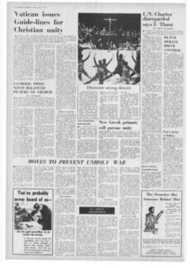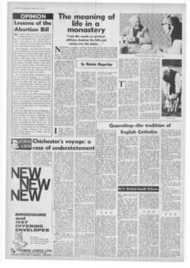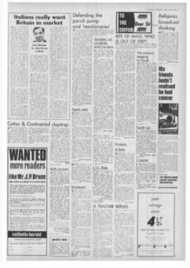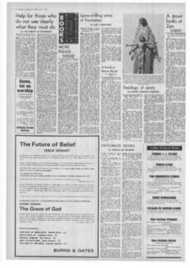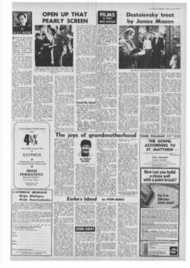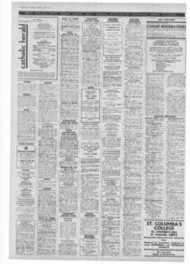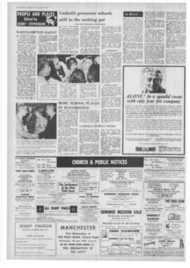Page 4, 2nd June 1967
Page 4
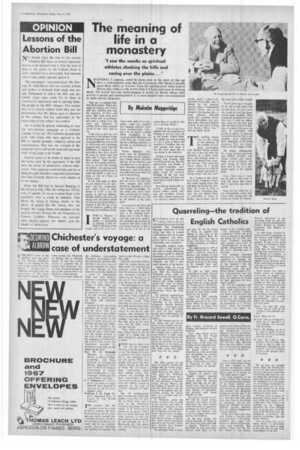
Report an error
Noticed an error on this page?If you've noticed an error in this article please click here to report it.
Tags
Share
Related articles
The End Of A Long Journey Home
Devil May Care Reforming Zeal Of A: Practical Tenth...
A Version Of Muggeridge
Muggeridge Meets The Maharishi
Memories Of Malcolm Muggeridge
The meaning of life in a monastery
By Malcolm Muggeridge
racing over the plains ..."
NOTHING, I suppose, could be more alien to the spirit of this age than a contemplative order like the Cistercians with whom I recently spent three weeks at Nunraw. Even the aspiring good today tend to believe that virtue is only worth while if it finds expression in virtuous deeds. The notion that any useful purpose is served by monks whose chief activity is prayer and contemplation is, in most people's eyes, too nonsensical to merit serious discussion.
TIley are, it is alleged, fugitives from reality. When they might be helping their fellow men they selfishly seek only the salvation of their own souls. They turn away from the world and its problems. and seek a refuge from the trials and dilemmas of earthly life in a little secluded world of their own. And so on.
I can only say that my own reaction to the glimpse I had of the Cistercians' way of life was quite different. In a world in which everyone is pursuing material ends, good. bad and indifferent, it seemed to me marvellous that there should be some to stand aside and seek only to know and love their creator. Their austerities, far from being pointless, were to me like the training of athletes—the putting aside of immediate gratifications in order the better to play in a team, or row in a boat, or run in a race.
If for such ends as these we are prepared to eat sparingly and live strenuously, how much more to draw nearer to God! f saw the monks as spiritual athletes. blithely climbing the hills and racing over the plains which lie between us and our Maker, instead of, like the rest of us, out of condition. puffing and blowing and stumbling along.
WAS in Nunraw. I should explain, primarily to participate in making a film for B.B.C. television of the monks and their daily lives. There were eight of us altogether, under our youthful and talented director, Lawrence Gordon-Clark. Filming is by its nature a rather tetchy occupation in the course of which ill-temper can easily blow up. I have never known a filming operation to proceed as harmoniously as this one did.
Father Benedict, who looks after the guesthouse, put his finger on the explanation, I think. When I thanked him for all his kindness and consideration, to me particularly—because I stayed in the monastery—and to the others who often had meals there, he said it was nothing.
St. Bernard, he explained. had laid down the rule that every stranger and visitor should be regarded as Christ and treated accordingly. No one could have more faithfully carried out an instruction than he did this one, and we all reacted in the same spirit.
It occurred to me then, and even more as I write these words when strife and war seem to be erupting everywhere, how if only St. Bernard's rule were to be universally accepted and applied all would be well. How could we ever bring ourselves to kill or hurt anyone if it was in our minds that we would be killing or hurting Christ?
I tried, as far as was compatible with the exigencies of filming, to live the same life as the monks. Father Benedict called me each morning at 4.15; I went to Mass and usually to Compline, and was well content with more or less the same spare diet as was served in the refectory.
Perhaps I hoped that some shining and burning light would break for me; that the questionings and doubts of an under-nourished, overexercised twentieth century mind would be resolved. Nothing of the sort happened, though I did have one small vision which I shall now recount.
Our filming necessarily involved interviewing the Father Abbot--whose holiness and excellent vivacity have left a lasting impression --as well as a number of the monks, given a special dispensation from their rule of silence for the purpose. Among others, I interviewed Brother Oliver, who is in charge of the farming. He is a large, cheerful, rubicund monk who combines exceptional shrewdness and acumen with a blessed simplicity of faith. It was while talking with Brother Oliver that I had my small vision.
THE lambing season was on, and owing to the clemency of the weather all was going particularly well. Brother Oliver pointed this out to me, and drew my attention to a lamb newly born, and frisking about in the most cheerful and vigorous manner. Then came my vision, which--as I should suppose to be the case with all visions—simply amounted to seeing reality with new eyes.
As I looked at this newly born lamb, I seemed to hear the monks singing Agnus Dei and there before me was veritably the Lamb of God; a little, tender, bounding creature, only just licked clean; so vulnerable, so weak, so perfect; one of many, and at You'll grow up, I thought, to be one of the sheep that err and stray, but now you're the Lamb of God; the Incarnation made manifest. What a fantastic moment in history that was, I went on reflecting, when for the first time men saw their God in the likeness of a lamb! Not, as in the past, in association with power or riches, or physical strength or beauty; but as the weakest. most vulnerable. least menacing of all living creatures. That was henceforth to be the image of God.
Of course, subsequently the image became perverted and defiled—adorned with jewels, carried onto battlefields, set up on thrones. Yet each spring, for those that have eyes to see, it is presented again in its original form.
Every lamb that is born can be seen as the Lamb of God. Oh, Agnus Dei, Agnus Dell I said over and over to myself.
Such was the small but, to me unforgettable, vision that I had while staying with the Cistercian monks at Nunraw.
blog comments powered by Disqus



